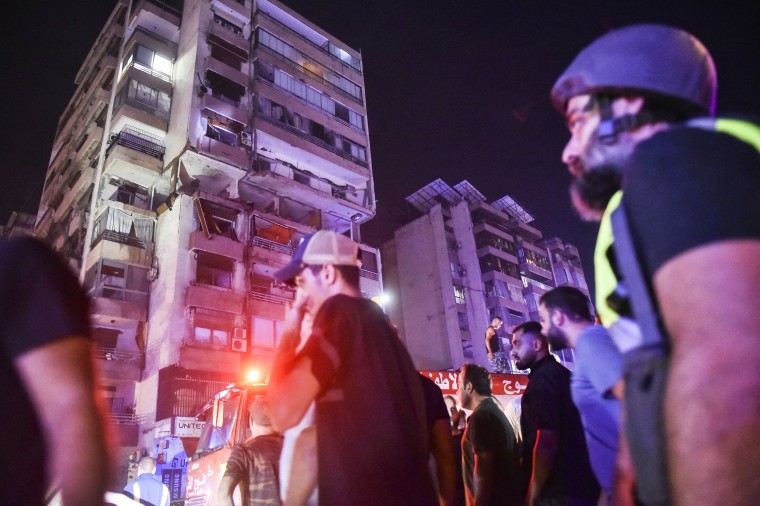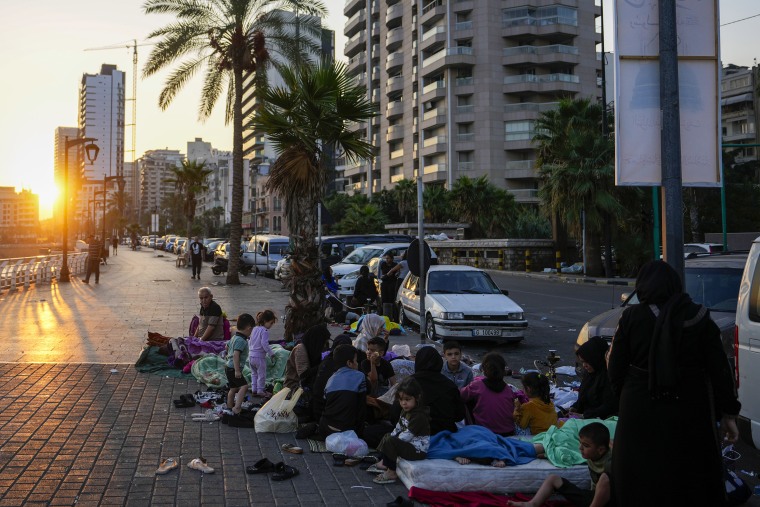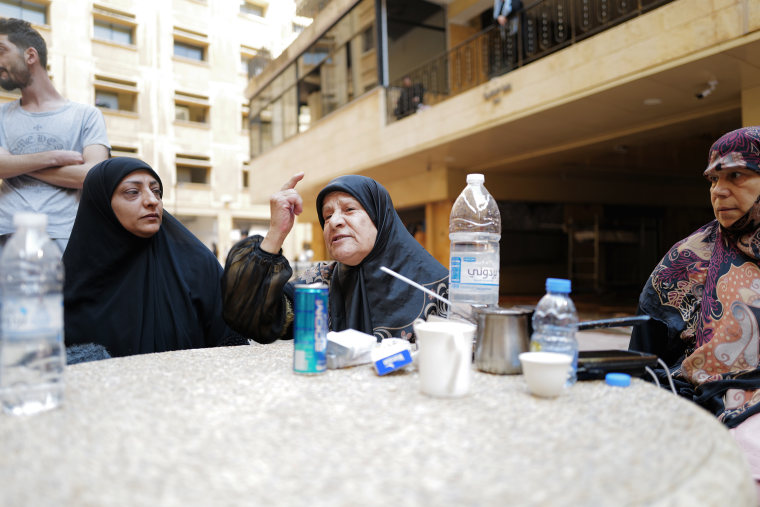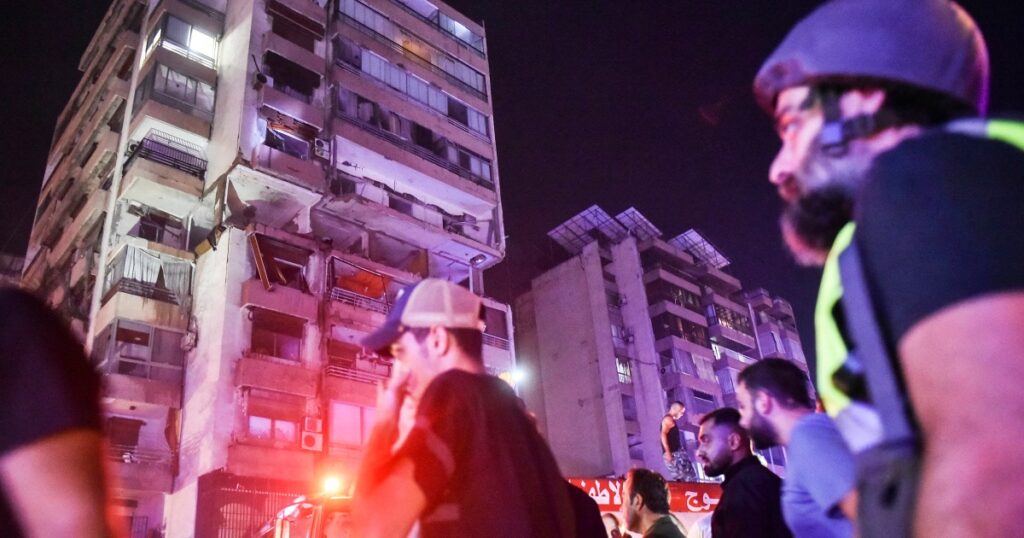BEIRUT, Lebanon — Fear rose across Lebanon on Monday after Israel launched an attack on residential buildings in central Beirut. It marks a new escalation in a devastating bombing campaign that has already killed more than 1,000 people, local officials said.
“There is no guarantee of safe space in Lebanon,” said Jihan Kaisi, executive director of the Relief and Development Association, a national organization that supports displaced people.
Lebanon’s prime minister says as many as 1 million people have been forced to flee their homes in recent violence.
“The Kora district is crowded with families,” Qaisi told NBC News after Israeli airstrikes hit buildings in the city’s most populated areas, a stone’s throw from downtown Beirut. These are displaced families who came to this area thinking it was safe.”
“We were shocked that this area was bombed,” she said of the attack. The attack appears to mark Israel’s first attack on the center of the capital since the 2006 war between Israel and Hezbollah.
The Palestinian militant group Popular Front for the Liberation of Palestine said three of its members were killed in a strike in central Beirut early Monday. Humanitarian workers said many civilians had fled the center of the Lebanese capital, believing it to be safe from Israeli shelling. .
Follow live updates here
Two stories of the target building were severely damaged, exterior vehicle windows were smashed, and debris was scattered across the road. Residents hurriedly removed debris from storefronts, some using brooms and others with their bare hands.
Izdihar al-Fouani, 40, told NBC News that he feared there was nowhere safe for him and his family, who fled from the southern suburbs of Dahieh to central Beirut.
“So we are sitting and waiting,” she said, adding that the family still did not have a mattress or other basic supplies. “Something may or may not happen, but if God wills, things will get better.”
Meanwhile, in southern Lebanon, Israeli officials told NBC News that the Israeli military had begun launching small special forces operations ahead of a possible ground attack.
The official said the operation was aimed at gathering intelligence and investigating Hezbollah’s position, but the raids had been underway for several months and did not necessarily indicate an imminent ground attack. he warned.
The US government continued to urge against further escalation in an effort to avoid all-out war in the region.

Israel says the campaign in Lebanon is aimed at ensuring the safe return and long-term return of communities in northern Israel who have been forced to flee their homes amid nearly a year of escalating hostilities between Israel and the Iranian-backed militant group Hezbollah. It was announced that the purpose was to ensure safety. He vowed to continue attacking Israel until the war in Gaza is over.
Thousands of families have also been forced from their homes in southern Lebanon over the past year due to cross-border attacks.
More than 1,000 people have been killed in Israeli airstrikes in Lebanon so far, according to the Lebanese Ministry of Health, and on Friday, Hezbollah leader Hassan Nasrallah was killed in an Israeli airstrike, with Iran vowing retaliation. Shock is spreading throughout the region.
sleeping on the street
Meanwhile, Lebanese Prime Minister Najib Mikati said footage emerging from southern Lebanon shows the destruction of once-inhabited areas, with more families being forced to create improvised shelters on the streets and beaches. , said as many as 1 million people had been forced from their homes. By civilians.

Fatima, 32, who gave birth to a newborn a few days ago, said she and her family fled the south to central Beirut over the weekend in search of safety. But after struggling to find shelter, she said she was forced to sleep on the streets.
“It was horrible,” said Fatima, who asked that her last name not be used out of safety concerns. “You can’t breastfeed a baby that’s constantly crying,” she said, adding that she was also in pain and worried that her C-section surgical wound had become infected.
“We need medical help and are waiting to see which shelter will take us in. Maybe we can get some support or food,” she said.
“Look at our situation,” said Nayef Fuani, who has taken refuge with hundreds of others in Beirut’s Azariye commercial center. “We were eating dinner, the food was still on the table,” he said of the time he suddenly had to flee his home in the city’s southern suburbs.
“Well, at the end of the day, we’re all going to die someday,” he said.
“There is no safe place.”
URDA Director-General Kaisi said humanitarian workers were “shocked” by the Coke strike.

Meanwhile, civilians displaced by Israeli airstrikes in southern Lebanon, where Qaissi is currently based, are also fleeing to the city of Saida (Sidon) after deadly airstrikes in the area on Sunday. , said they were living in fear. The IDF did not immediately respond to a request for comment on Monday’s strike.
Kaisi said thousands of families have taken refuge in Saida believing they are safe, with many taking shelter in crowded schools that have become evacuation centers and others on the streets or in parking lots. They had little choice but to sleep in the car lot or the school playground.
And she said a growing number of people are expressing concern that Lebanon could end up like Gaza if Israel’s bombing campaign doesn’t end, with Israel’s nearly year-long bombing campaign killing 41,500 people. He said he was concerned that more than one person had died. enclave.
“There is talk that Lebanon may face the same situation,” she says. “My family is scared.”



